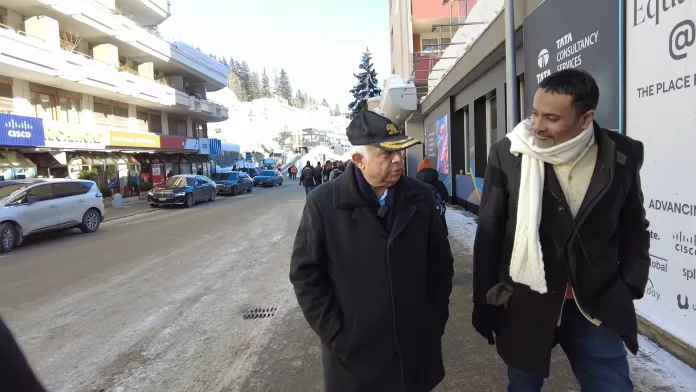Sir, 20th year in a row. Well, you’ve been coming for 30 years now?
Yes. Actually this is my 31st year but 30 years as a member. The first time I came with a government delegation here, then I became a member. But the main thing is the Pakistan Breakfast, this is the 20th year. And, you know, really, for me, it’s a big occasion because projecting Pakistan in a sea of other countries, mainly you see India. I mean, you can see Tata here and you can see Infosys and other Indian states so to project Pakistan for me has been a great challenge and an opportunity and I really think a great opportunity given to me by Allah Almighty to project my own country.
Would you like to recall the first time, during the Nawaz Sharif government, so, how was it introduced to you?
No, no, no. That, you know, I actually came with Mian Nawaz Sharif. Mr. Sartaj Aziz and all were holding an Investment Conference in Zurich which was very well attended. And after that, Mian Nawaz Sharif asked Arif Nizami and myself that we are going up to a place called Davos, come along. I mean, we had actually never heard of Davos at that time and so were a little reluctant. But because Mr. Sartaj Aziz insisted, we said okay, we’ll come. So there
was a group, a lot of media personalities but the two of us were singled out. We came here and in fact we stayed in a very small hotel called Ochsen, I still remember. During that process, while we were in the Congress Center, you know, totally by chance, I was having coffee there and this lady came up to me. The Chairman’s office at that time was a very small, Klaus Schwab. And the lady said, where are you from? I said, Pakistan. She said, can I have a cup of coffee with you? I said, sure. She said, I’m the executive secretary
to the chairman, Mr. Klaus Schwab. In fact, I had just heard of him there only. I was wearing a media badge. We talked about… Pakistan, the media generally. The next day when I came back, she came up to me and she said, “You should not be wearing a wrong badge”. I said, why? She said, ‘you’re wearing a media badge’. I said, ‘Yes, but I write regularly for the Nation and the Editor also is also here’. She said, ‘No, you’re a businessman and you should have a white badge, which is for a businessman.’ I said, ‘I don’t know about that’. Anyway, again we talked about business and my writing and my weekly columns, she went away. The third day, again, you know, I was passing by and she stopped me. She said, ‘Dr. Klaus Schwab wants to see you’.
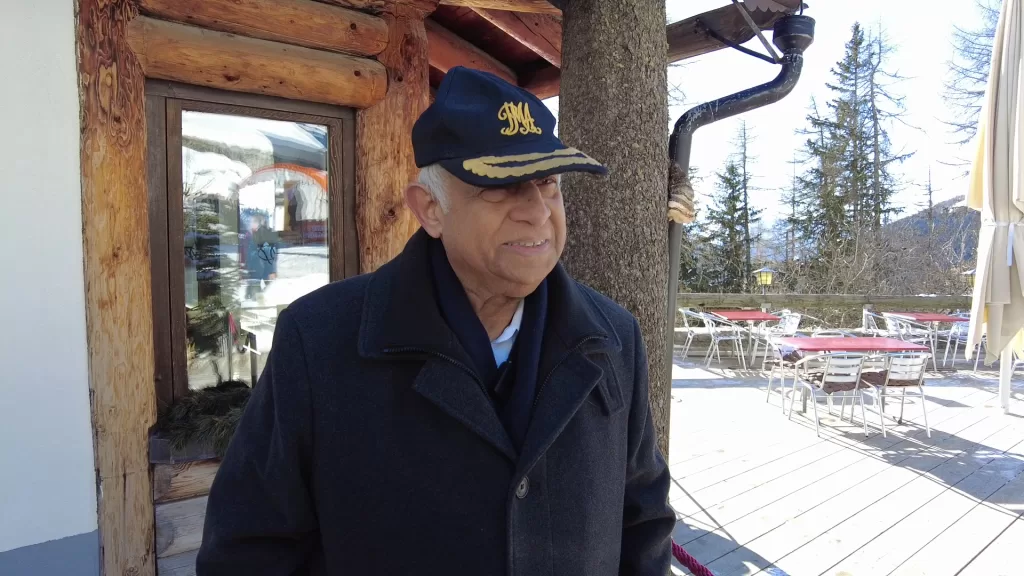
So, I thought, you know, I am in for the media badge. You know, I shouldn’t have had the media badge. Dr. Klaus Schwab said, you are very interesting you’re the only businessman I know in the world of some stature who writes a weekly columns. And I said, ‘I didn’t know that’. He said, ‘well, it’s my business to know. Would you like to become a member of the World Economic Forum?’ I said, what does it take? He said this is by invitation only. And presently, it will cost you 20,000 Swiss Francs to become a member and moreover, if you want to attend the things/events regularly then whatever the annual charges are, you’ll have to give and of course, your hotel expenses and all’. I said, ‘I think I should be able to do that’. So, I became a member. At that point there was stipulation that the annual turnover must be 100 million dollars, this was waived by him. So because of Ms Anne-Marie Messier I became a member in 1994. I kept seeing “India Shining”, India this, India that, for 10 years so I asked myself, ‘why aren’t we doing something?’ I asked the others Pakistanis, I would not like to name them. I said, ‘why don’t we get together and do something on our own?’ Their answer was, ‘No, no, it takes a lot of money’. Okay, fine. Let me see what I can afford. So I went around, asked what it takes to have 1994. a breakfast. And then I went to General Musharraf, you know, General Musharraf and I served in the Army together and he was a good friend.
So I told him I said I want to take you to something called the World Economic Forum. He asked, ‘What’s that?’ I said, ‘Well only when you go there you will find out’. He said ‘okay, only because you are asking, I will go there. So he came here. I booked the Steigenberger Belvédère for 150 people and 250 came. He was a sellout, you know as a sellout everybody came, whether it was Bill Gates, whether it was Jeff Bezos, whether it was Richard Branson. Everybody was there, I mean, it was sight to be seen. It was such a great thing for Pakistan. That was what, you know, I could not believe it, 2003 that year, and he was very good. He spoke very well. And therefore, you know, till he came again in 2005 and 2007, Shaukat Aziz came in 2004 and 2006 And then after that, we had
Mian Nawaz Sharif here, twice. We had Yusuf Raza Gilani from the PPP. We had, in between, there was, you know, no traction. So, I got Imran Khan. In fact, the World Economic Forum asked me, ‘why are you getting a sportsman in?’ I said, ‘he just might be a future Prime Minister of Pakistan.’
Actually, this was in 2010 or 2011. So, they said, okay, fine, you host him. So, we hosted him for the first time in 2011. Then, of course, we had, you know, Mian Nawaz Sharif again. Then we had Shahid Khaqqan Abbasi. We had General Raheel Sharif here. We had, you know, we had Bilawal Bhutto here. That thing is we didn’t look at any particular political party. We just said, Pakistan. We are Pakistan. And you believe me, every one of the Pakistani leaders did not talk about the dirty linen of Pakistan. They talked about Pakistan only. We had requested them that here we are all Pakistanis. And they stayed with that particular theme and we did very well. We’ve never had less than, except for one year when the Prime Minister Nawaz Sharif had to go away because the Saudi King had died and we had less than 200 people. Frankly, we’ve never had less than 200 people in a room that fits only 150. That by itself shows how much of interest there was, you know, in Pakistan at that time. And we want to revive, keep that interest going. This time I’m very grateful to Anwaarul Haq Kakar that he is coming. He was here, by the way, in 2018 when Jam Kamal came as one of the speakers as the Chief Minister of Balochistan and he did one or two sessions, which were very good.
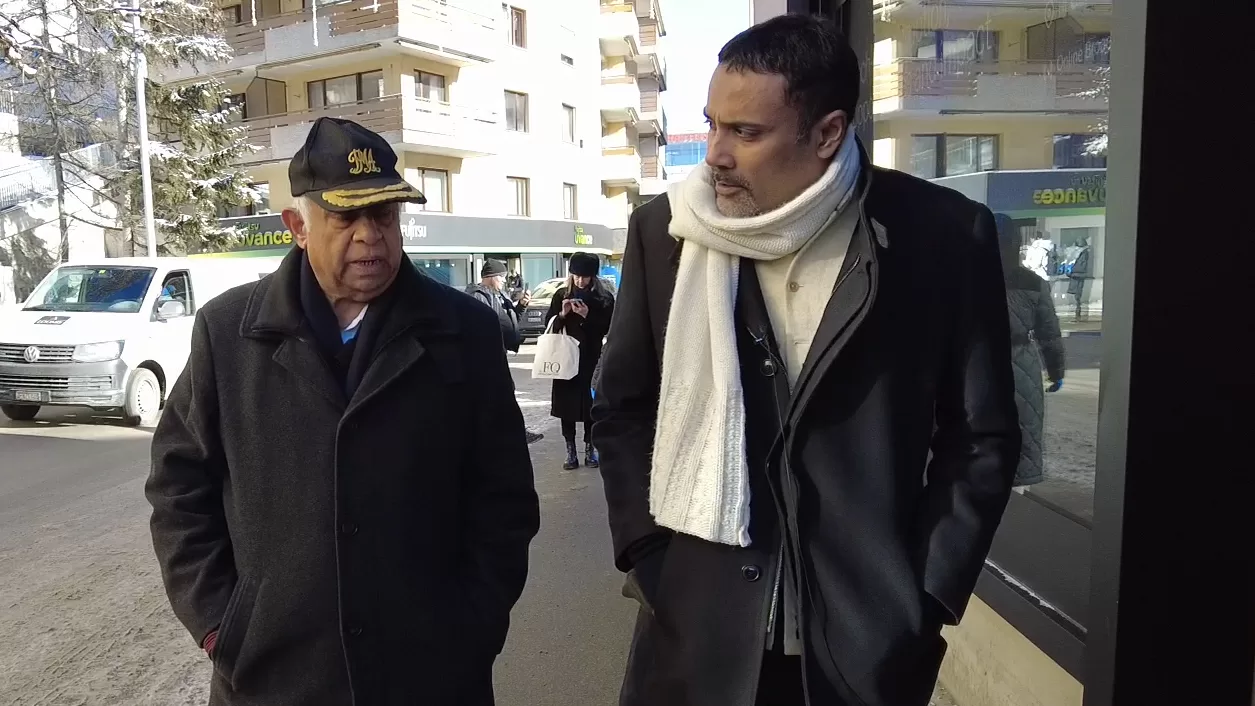
So I asked him, ‘Why don’t you come in on your own right now?’ And he very readily accepted and so we’ve got him here now. Insha’Allah, we’ll be doing the Pakistan Breakfast tomorrow and hopefully he’ll be there. And our agenda is really simple – Pakistan and Pakistan alone. You know, I couldn’t care a bit, you know, about which political party is concerned. General Raheel Sharif was here from the Army and he was brilliant and out of 200 speakers that are rated in the poll that they take afterwards, he was rated fifth. Out of 200 speakers, he was rated fifth. Can you imagine? It was a moment of great pride for us.
So, Sir, where do you think Pakistan is? Where are we in our journey?
Actually, we got mixed up in our journey somewhere because we do not face facts. You know I’ve been saying this for a long time. I’m one of the people who really believe in democracy and I believe in proper grassroots democracy, I have been saying that unless you have Local Bodies Elections you cannot have proper democracy. I have also been saying that if you want to really have representation of people then anybody who stands for Provincial Assembly or National Assembly must have first qualified for the Local Bodies. If he doesn’t have a root somewhere, the Provincial Assembly or National Assembly is just a debating club, which it is now. I mean, you hardly see somebody comes in, passes an Ordinance then changes the Ordinance. But I think it requires a little bit of therapy, we cannot become hidebound by the British rules and things like that. We have to think out of the box. We are a South Asian country, we’ve got to do one thing.
Number two, let me be very clear about it. See, and that is where we go wrong, that is why we have Army interventions. You have to accept that the Army has a role in Pakistan, it has a role in Pakistan but not in governance. But the point is that its role must be recognized as a corrective course without intervening. You know, the Army cannot run the country. It is the civil elected people and the civil bureaucracy that can run the country. But the army has a role to play. I have been saying this time and again. I said Pakistan is because the Pakistan army is. The Pakistan army is because the Chief of Army Staff is. The Chief of Army Staff, I may like him, I may dislike him, I may like his views, I may dislike his views but he is the Chief of Army Staff. We cannot afford to say or do anything that denigrates his position, that undermines the authority that he wields.
We have to accept it. And then he has come across a process that is very exacting. He’s gone to a Captain/Major Promotion Exam. He’s gone through the Staff College. He has done his National Defence University, he’s gone abroad for studies. All Chiefs of Army Staff more or less have done that. They commanded a Division, command a Corps, he has gone through a process and he has been tested already. So, all right, he may like you more or he may like him more, but you have to accept his authority, don’t undermine him. But on the other hand, the Army must remember that yes, they can do course correction, wherever they feel that the national security of Pakistan is endangered, and that can be in external, internal, it can be due to the economy, it can be due to water security, anything. Then they should do quietly, and they do. The National Security concept must be made more effective.
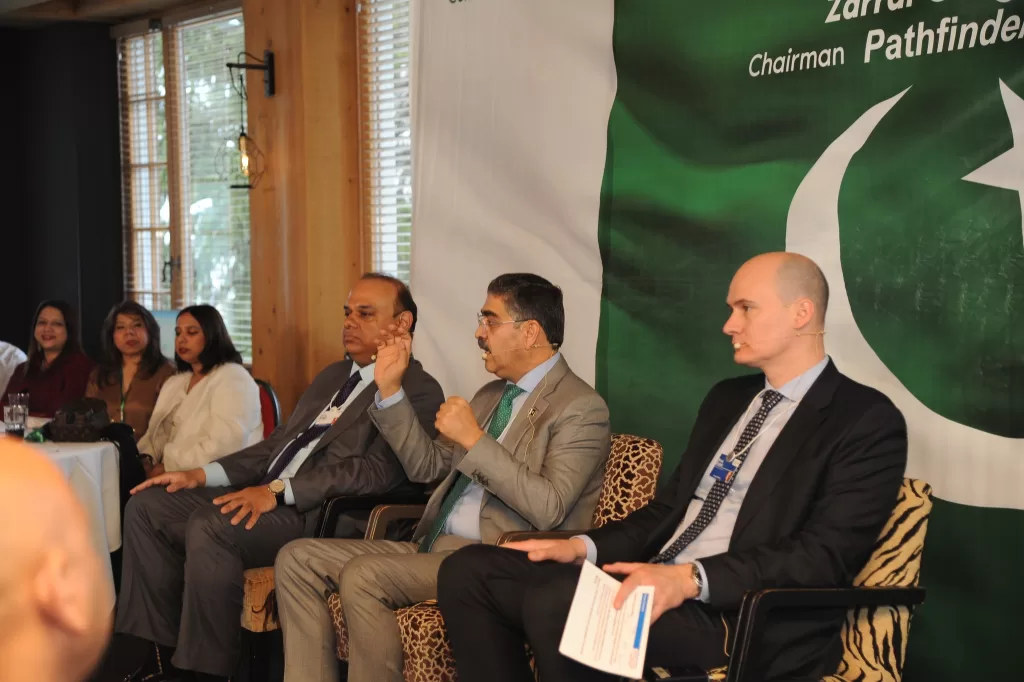
So, I think that is the problem. We cannot define the role. We’ve just made it into the British Parliament, come on, for God’s sake even the British Parliament has become a joke. You know, so now it’s time to get beyond the British Parliament, to get beyond this, you know, Section 1, Section 3, 1, 62, (1) applies to you, 62 does not apply to you, let us not be hypocrites. People sitting in the Supreme Court do not realize what’s going on outside? It is the job of the Supreme Court to maintain that discipline, but they have to do it in a fair way, not in a way that really goes in a way that, people get a brand of that. You may or may not like Imran Khan. You may or may not like what his wife does. I don’t like it, right? But I like Imran. But so what? I like Mian Nawaz Sharif. I like Bilawal Bhutto Zardari.
So, what difference does it make? I like, by the way, I like Chaudhary Shujaat Hussain very much, he’s always been very nice to me. He’s got his own idiosyncrasies. So, what about Maulana Siraj-ul-Haq and Jamaat-e-Islami, can you discount them?
They’ve always stands on principles. Look at Naeem-ur-Rahman in Karachi, he stood on principles. So, let’s go with it. Let’s get this thing sorted out. Let’s not be hypocrites. I think the Army role comes in accountability. If they give a proper role in accountability, and don’t have these judges, somebody taking off here, somebody going sick, somebody after two years remembering God and coming out with the truth.
I was speaking to somebody a few days ago, they were saying the world has really changed. None of the old school economics that we were taught now works. Even for countries, in the case of Pakistan, it was said that Pakistan can even sell cheap rice to certain countries. They have to take it through India.
Because for you, it’s because of your bureaucratic problems, this is the biggest thing that your army has done. This Special Investment Facilitation Council. Of course, we are projecting them here. I have no project with them but I am projecting them here because they have cut across all the red tape. They have made it easier for the businessman. The businessman can now go and say, okay, here is what we want to do. That is what is required, if you make it easier for the businessman, he will do for Pakistan. And I tell you, you know what we’ve done in IT, do you think India can beat us in what we’ve done? The World Economic Forum is projecting Pakistan’s success story.
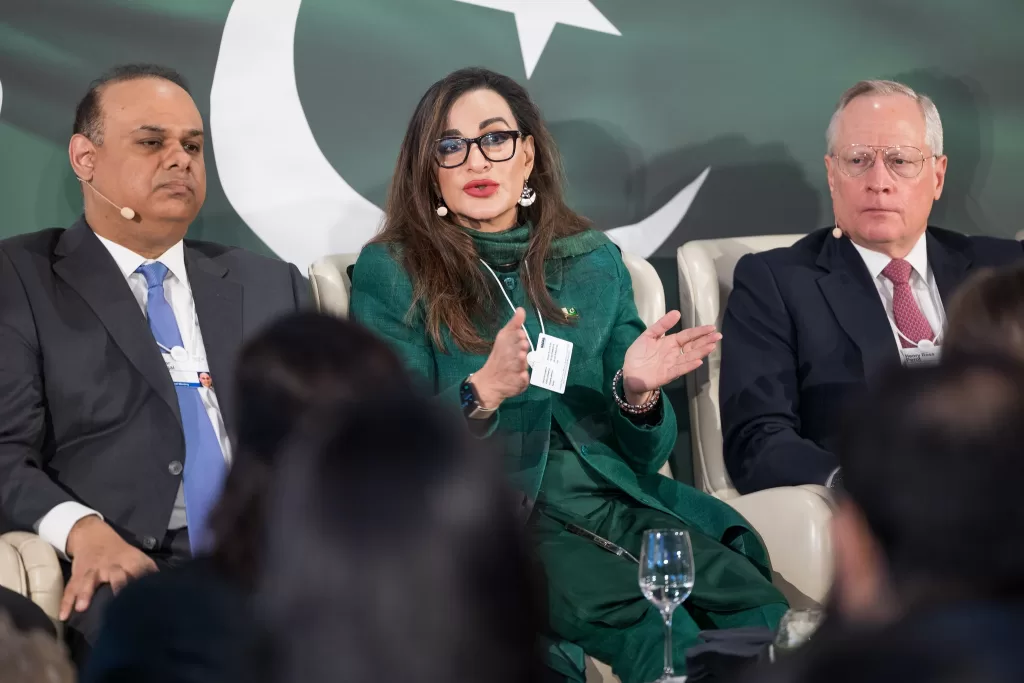
How would you describe the relevance of Pakistan in this day and age? Are we still relevant to the world?
Without Pakistan, this whole region would be in chaos. Anybody who looks at the map, look at Pakistan. It is in the interest of everyone, the West, the Chinese, even India to make sure that Pakistan is a stable country. India is being very short-sighted about this. If Pakistan descends into chaos, India will have such turmoil that you can never even think about. India has far more fissures than we have, it has 80 million Brahmins and 200 million other people, approximately 400 million ruling 700 million people. Dalits, the tribals, the Christians, the Muslims, this is one minority ruling over the vast majority and calling themselves a Hindu kingdom. They’re not a secular country by any chance. These are the characters. I mean, the greatest hypocrite was Mr. Modi taking the world leaders to Gandhi’s mausoleum. They’re the guys who killed Gandhi. Modi was part of that, I mean, not the RSS but very much a part of BJP in one way or the other. So let’s be very frank about it, if we go into turmoil, the entire region will go into turmoil. The entire region, whether it be the Middle East, whether it be India, etc, all will go into turmoil. So it’s the interest of everyone to keep us stable and correct. So, let’s not talk about this. And I tell you, that national security that we are talking about, the Pakistan Army is the best guarantee of that. Let us not forget it. But, okay, no business running the country. And I tell them all the time, you read my articles, so don’t run the country, run the people who run the country.
Thank you for addressing that relevance. Now coming to India, we expect and it’s all set on the timeline that India will soon take over China as the world’s largest country.
It will not. Start with that and be very clear about it, it will not. Whatever the West may do, it cannot. India has got a lot of problems. You see, Modi has got away with it and also the businessmen have supported Modi and all that but the Chinese have gone into a different sphere as far as India is concerned. They cannot and then, very frankly speaking, they’re telling lies as far as Ladakh is concerned and the Chinese are occupying all the high ground in Ladakh. The Indians are just not publicly proclaiming it just for their own purposes. Modi, you know, it’s like Pakistan, you know the strikes, they build on the strikes.
The Indian public doesn’t know that we hit six places and without causing a single casualty. Why? Because we wanted to tell them that we can do this, so that was some capability. Let’s be frank about it, India has got a lot to gain by having a stable Pakistan and we’ve got a lot to gain to have trade with India. There’s no doubt about it. Bilateral trade with India helps us greatly. Bangladesh, for example, we have complementary economies, we should have bilateral trade. We should have this thing like Jute and tea come from there, from here cotton, cotton textiles go there as well as Rice. We have to look at the relationship in India, we don’t say to them to hand over Kashmir to us, they are not going to do it We can have Some arrangement over Kashmir, you know, maybe free borders, like Musharraf was doing, you know that I was actually banned for some time in the National Defense University for suggesting this. But, within six months, Musharraf adopted that and had given that as his proposal to India and it was working.
Soft borders, trade had started, it led to, you know, maybe Orange Passes and Green Passes where Kashmiris could have visited each other across the border. As the tensions would have eased down, things would have picked up and would have trade. We very much need trade with India. But we cannot do it on Indian terms. And because of that, what is happening? Because of that, the Indians don’t have access to the whole world by road and rail because we are there and they don’t allow us through to Bangladesh or Burma etc. Why should we allow them access this side? We have to be very pragmatic about it. We have to come to some agreement. And the Indians have to understand that at the end of the day you cannot take away that India is a big country, that India is a big economy but they have to learn to live with their neighbors. They cannot, what has happened in Bangladesh, Nepal, Sri Lanka and Maldives and hope to get away with it all the time. You think people in Bangladesh love them? You think the people in Nepal love them? You think people in Sri Lanka love them? Let me tell you more. Pakistanis don’t hate Indians so much as much as these people do.
So now let’s talk about Pakistani people. You know they say for any democracy to thrive you can’t really rely on courts because everyone starts taking their cases to the court, court will run out of time and space. So eventually it comes down to the integrity of individuals. So for Pakistani people, how important is it, you think, for us or for people in power, people who are in, let’s say, in powerful positions to start educating people? And what’s the need for our people to also realize this?
Mansur, what you’re talking about is theoretical. What I’m going to suggest is practical. And I say to you that the vast majority of the Pakistan Armed Forces retires around the age of 45, whether they be officers or not. So, don’t retire them, don’t put them out, right? Only retire those people who want to be retired. People who want to stay in service, transfer them, transfer them to what is known as Homeland Security. And from Homeland Security, give them to the judiciary, give them to the law enforcement agencies, police, give them to the paramilitary forces like Rangers and Corps, give them to medical sector, etc. Use the trained manpower. Don’t retire them. Use the trained manpower. Now, to give an example, I just want to give a small example. Every Major when he retires, he’s done his PM2 major performance exam and he’s done his Military Law. It just takes six months more in a judicial academy before retiring to become a magistrate. Can you imagine that if you had magistrates around the clock in the police stations, most of the cases would be decided in the police stations. And moreover, can you imagine that the SHO would not have such arbitrary powers that he has now? And can you imagine what a change this would bring about in the law enforcement agencies? Let the police have the thing, but stop the recruitment at the lower level. Bring your trained manpower into the police. Take your trained manpower into the Frontier Corps, into the Rangers. Stop this pension bomb also. You already got a financial problem. This is very separate. So don’t talk practically that you want to educate them, you’ll do this and that. Make it happen. You have the manpower available to you. You know i have a private security company. I have 500 requests every time they retire each year, 500 requests a year of Majors. I can hardly accommodate a few of them. But it doesn’t look good. How many people can accommodate like that? And they are trained manpower and they can be used. Okay, let’s look at their promotions. They don’t affect the promotion of the judiciary. They don’t affect the promotion of the police. That’s a formula that I don’t understand. Experts can work out. But don’t allow your trained man power. So don’t talk about theoretical education. Every government that comes talks about that, that doesn’t get us anywhere.
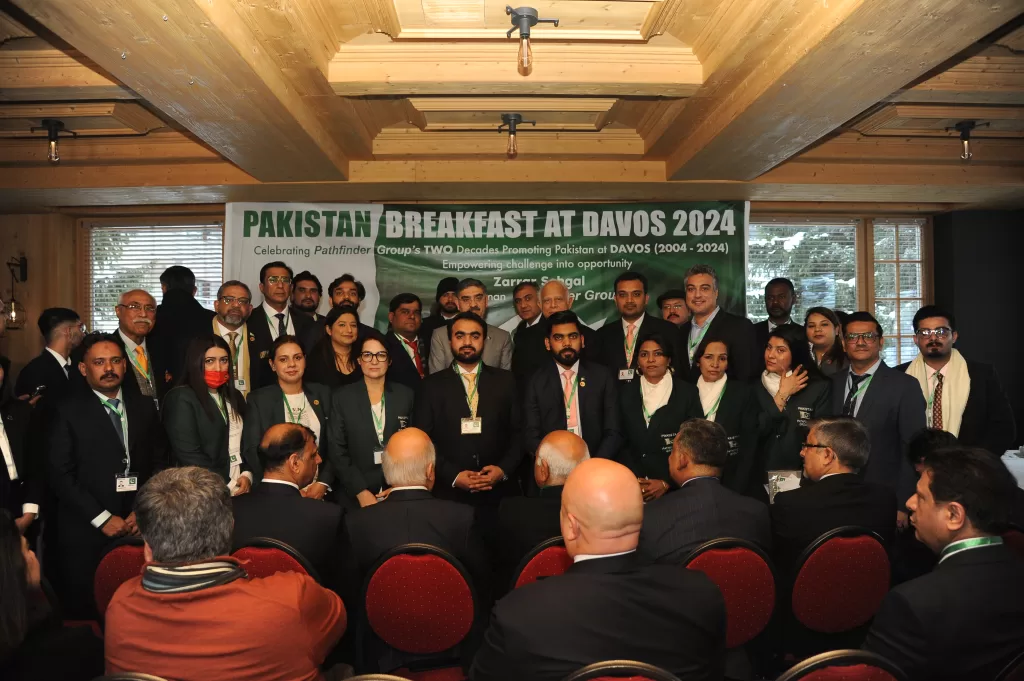
Awesome. Sir, as a businessman in Pakistan or as a leader in your field, I’m sure you’ve come across many situations where, you know, at the end you have to, for lack of a better word, compromise or come to terms on certain situations. My question here specifically is that how difficult it is at times to say ‘sorry’ or to say, ‘okay, this was a learning’. Because when you look at a lot of these people in this world, a lot of unlearning is happening. And they say one of the things that sort of blocks unlearning is also people’s own mind. So as a senior business leader, how would you advise young business leaders in life as you navigate through?
Never, never, never hesitate to cut your losses. My father taught me one thing very clearly, never reinforce failures. I’ve had a lot of failures. I’ve had businesses that have never taken off. I have never taken off for various reasons, maybe my managers were inept. I chose the wrong people to lead them. Like, I had a company that went bankrupt. And the person who was trying to sell it off. You know? And I, at the last minute I said, how can you sell this company off when you know it’s not working? ‘No, no, sir,’ he said, ‘it’s all right you’re getting 20 crores. What is wrong with you?’ You know you have to be sincere and have to make sure. I heard a very good speech by Hussain Dawood the other day. He talked about sincerity. He talked about truthfulness. You have to be truthful to yourself first and then decide how truthful you can be to others.
Sir, that’s a good one. And so one more thing about personally as Ikram Sehgal, you’ve been doing this for so long and you’ve been committed. How would you like the next couple of years to turn out of Pakistan?
I would like my son to continue this. You know, I’m 78 years old and as you were coming up, you know, I got dizzy a little bit, you people helped me. I’m Muslim. One day death will come, you know, will come unexpectedly and I hope it comes peacefully. But one has to pass on to the next generation. I think I’ve built up my son. He’s done well. And I built up a lot of people in my company. You interacted with a lot of people in my group, in my company. You know, so there are two CEOs here and you saw them, they were loading steel stands with their own hands. You know, so, you know, that is the Pakistani character. Pakistan has the best workforce in the world, whether the labor class, the skilled force, they are the best.
You just have to give them the leadership. Today we stand here, just imagine. Where are you people going to go after this? You’re going to go and see the cradle of Islam in Europe, that is Spain and Portugal. That is the thing we’ve given them as a reward for what they have done on the whole year, the selected people. Some of them are hardcore, of course. They get to go. They’re hard-working people. And the thing I said I hope my son carries this tradition on.
Any words on leadership, sir, one can learn a lot?
Leadership? Get your own character first correct. Once your own character and integrity is correct, any leadership is possible in the world.
So, any last words, anything that you’d like to speak about that we haven’t asked?
Yes. I’d like to speak to the leaders of Pakistan, whichever party they belong to. Don’t waste time insulting each other. Use your time to tell us what you can do for the nation and please do it.


